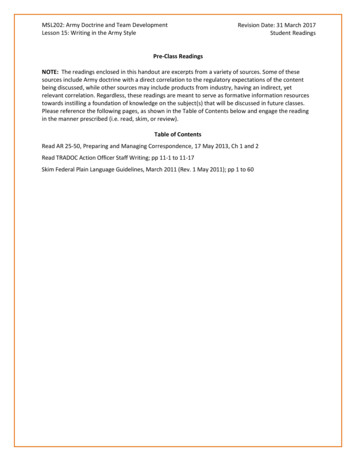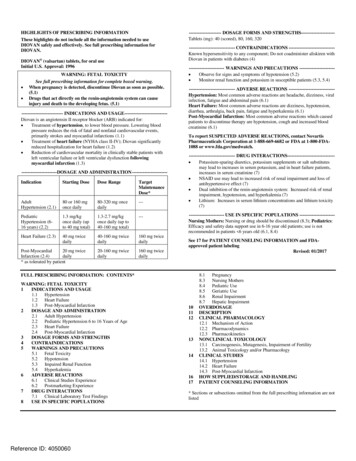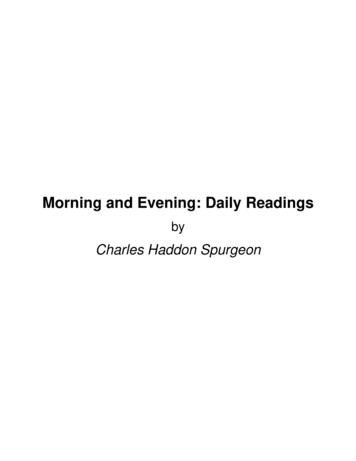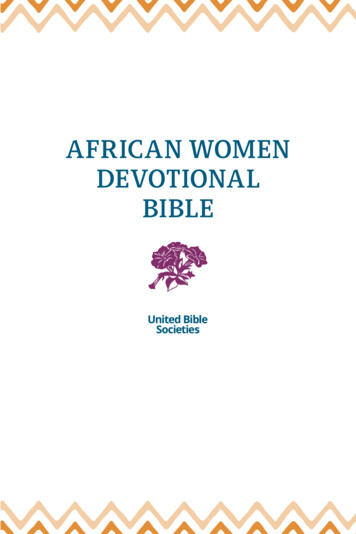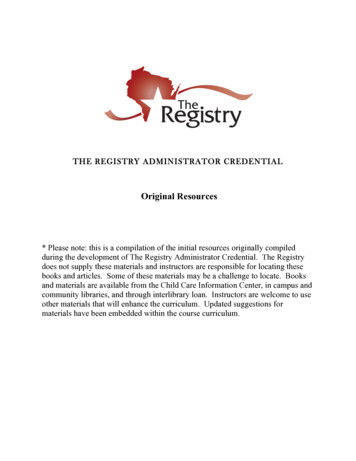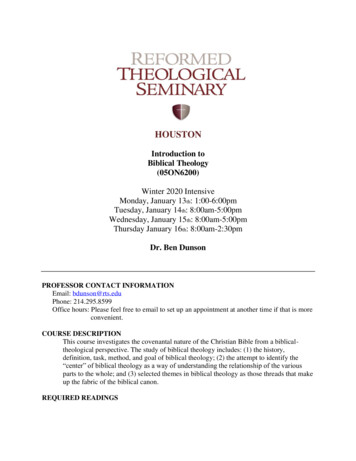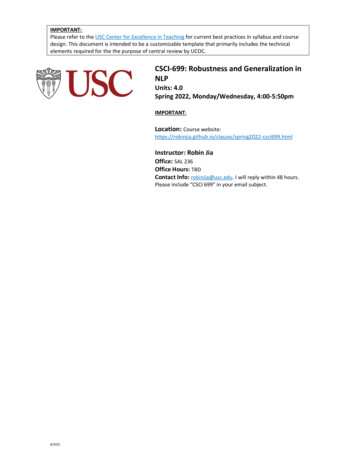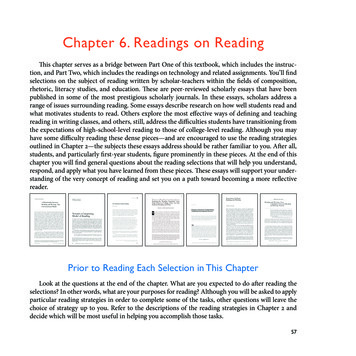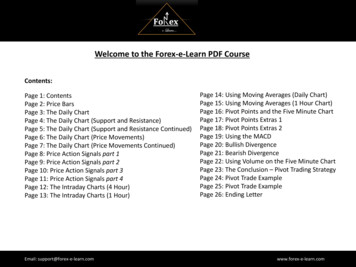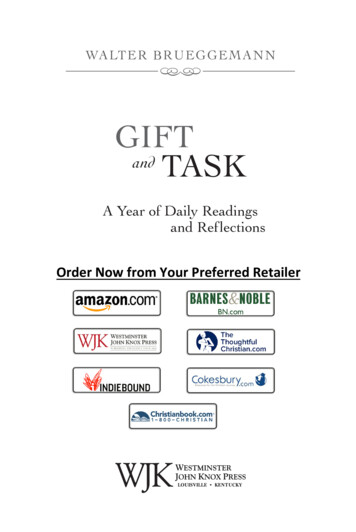
Transcription
WALTER BRU EGGE MANNGIFTandTASKA Year of Daily Readingsand ReflectionsOrder Now from Your Preferred Retailer
for Tia 2017 Walter BrueggemannFirst editionPublished by Westminster John Knox PressLouisville, Kentucky17 18 19 20 21 22 23 24 25 26—10 9 8 7 6 5 4 3 2 1All rights reserved. No part of this book may be reproduced or transmitted in any formor by any means, electronic or mechanical, including photocopying, recording, or byany information storage or retrieval system, without permission in writing from thepublisher. For information, address Westminster John Knox Press, 100 WitherspoonStreet, Louisville, Kentucky 40202-1396. Or contact us online at www.wjkbooks.com.Unless otherwise indicated, Scripture quotations are from the New Revised StandardVersion of the Bible, copyright 1989 by the Division of Christian Education of theNational Council of the Churches of Christ in the U.S.A., and are used by permission.Book design by Drew StevensCover design by Marc Whitaker, MTWdesign.netLibrary of Congress Cataloging-in-Publication DataNames: Brueggemann, Walter, author.Title: Gift and task : a year of daily readings and reflections / WalterBrueggemann.Description: Louisville, KY : Westminster John Knox Press, 2017. Includesbibliographical references. Identifiers: LCCN 2017005496 (print) LCCN 2017028531 (ebook) ISBN9781611648157 (ebk.) ISBN 9780664263218 (hbk. : alk. paper)Subjects: LCSH: Church year meditations. Devotional calendars.Classification: LCC BV4812 (ebook) LCC BV4812 .B78 2017 (print) DDC242/.3--dc23LC record available at https://lccn.loc.gov/2017005496printed in the united states of americaThe paper used in this publication meets the minimum requirements of the American National Standard for Information Sciences—Permanence of Paper for PrintedLibrary Materials, ANSI Z39.48-1992.Most Westminster John Knox Press books are available at special quantity discountswhen purchased in bulk by corporations, organizations, and special-interest groups.For more information, please e-mail SpecialSales@wjkbooks.com.
Easter129Pentecost181Appendix A: Notes for Liturgical Years2017–18 through 2021–22379Appendix B: Assigned Readingsfrom Ecclesiasticus382
PREFACEThe title I have given this book, “Gift and Task,” is a translation of the more felicitous German, Gabe und Aufgabe. TheGod whom we meet in Scripture is one who gives generousgifts in the wonder of creation, in the miracle of emancipation and reconciliation, and in the surprise of transformation.Human persons, along with all other creatures, are recipientsof those abundant gifts of God that are to be taken in awedgratitude, for which our best word from Greek is “Eucharist.”This gift-giving God whom we meet in Scripture is also the onewho assigns a worthy task, who from the first act of creationand the first utterance at Sinai has issued commandments, whohas summoned to discipleship, and who empowers to glad,trustful obedience.What follows in this book is a daily reflection on the Scriptures prescribed in the Daily Office for Year 2 in the EpiscopalBook of Common Prayer, the Daily Readings in the PresbyterianChurch (U.S.A.) Book of Common Worship, and perhaps othertraditions as well. Of course the exact dates of the church yearchange because Easter is a movable feast and Advent changeswith the calendar, so in this book I have ordered the readingsaccording to the church year that begins in Advent of 2017.I have judged that the specificity of that one particular yearwas worth the requirement of agility among readers for usein subsequent years, and I am counting on purists to pardonthe inevitable variations from prescribed readings that result.v
Suggestions for adapting this resource for use in subsequentyears can be found in appendix A.In many of these study reflections, it will be most beneficialto read the biblical text before reading the study material. It ispreferable, when possible, to read the text out loud, as biblicaltexts are meant for hearing. I have exercised freedom in selecting which text or texts from among the designated readings Iwould comment on each day. Readers of my work will not besurprised that my tilt and inclination are toward Old Testament texts. With only a few exceptions, I have not commentedon the psalm for each day, as I have had ample opportunityelsewhere to exposit the Psalms. I have taken the liberty ofselecting texts from Sirach (Ecclesiasticus), because it is quitefresh material for me and because Ben Sira is an uncompromisingly practical theologian and moral teacher. Mindful thatthese texts are not included in many Protestant Bibles, I haveprovided the text to those passages from Sirach in appendix B.What I have written is intentionally distinguished in twoways. First, I have written reflections that are intended forserious church members who are willing to consider in criticalways the cost and joy of discipleship. This means that I haveresisted any temptation toward a more generic “devotional,”because most materials offered in that genre are, in my judgment, quite romantic. Second, while I have not imposed muchcritical scholarship on the texts, I intend that my expositionshould be critically responsible and not excessively accommodating to popular itches.While I follow the daily readings designated by certainchurch bodies, I, of course, hope that my commentary willreach a larger reading community that is genuinely ecumenical, as no tradition has a monopoly on serious attention toScripture. Thus I hope my exposition makes room across thetheological, ecclesial spectrum for “progressives” and “evangelicals,” for we commonly share as recipients of the wondrousgifts of God, and we are commonly addressed by the summonsof the God of the gospel. It is my conviction—and hope—thatserious Scripture reading is and can be a source of missionalrenewal in the church.vi / PREFACE
I am glad again as always to voice my thanks to David Dobson, Julie Tonini, Jessica Miller Kelley, and their colleaguesat Westminster John Knox Press for the faithful and attentiveway in which they have transposed my words into a book.I am pleased to dedicate this book to the well-beloved TiaBrueggemann. She has been engaged with this writing projectall the way from its inception (her idea) to final authorial editing (her work), with sustaining energy in between. I am grateful to a host of persons who have made it possible for me toundertake this reading. That includes many pastors, teachers,and nourishing traditions; as indicated in my commentary forthe last day of the church year, it most especially includes thetradition of German evangelical pietism that is my true home.Walter BrueggemannColumbia Theological SeminaryJuly 2016PREFACE / vii
ADVENT
AD V EN T 1First Sunday of AdventPsalm 146; Amos 1:1–5, 13–2:8; 1 Thessalonians 5:1–11; Luke 21:5–19God of all our beginnings, we thank you for this new beginning inAdvent. Give us the freedom and courage to enter into your newness thatexposes the inadequacy of where we have been and what we have done intime past. Be the God of all truth in our midst. Through Christ. Amen.We rightly expect that Christmas will go “out like a lamb.”What comes from Christmas is indeed the Lamb that is slaughtered on Friday who is worthy of praise on Sunday, who takesaway the sin of the world (John 1:29; Rev. 5:12). Before that,however, Advent is “in like a lion,” a roaring truthfulness thatdisrupts our every illusion.The text from Amos begins, “The Lord roars from Zion.”The image is of a lion (from the temple in Jerusalem) who isseeking prey, thus a threat to the status quo. What follows inthe poetry of Amos is an exposé of the sociopolitical failuresof Israel’s neighbors and of Israel. The offenses of Damascus(Syria) and Moab and Ammon (Jordan) bespeak violation ofhuman rights and savage military assault. The affront of Israelis economic: “trampling the head of the poor.”Such texts assure that our preparation for Christmas is nota safe, private, or even familial enterprise but is preoccupiedwith great public issues of war and peace and issues of economic justice that concern the worth and bodily well-beingof human persons. Our Advent preparation may invite us toconsider the ways in which we ourselves are complicit in thedeep inhumanity of our current world. All these texts attest acoming upheaval because the roaring lion can wait no longer.The lion opens space for the Lamb, who will arrive soon.2 / WALTER BRUEGGEMANN
Monday after Advent 1Psalm 1; Amos 2:6–16; 2 Peter 1:1–11; Matthew 21:1–11Your coming, O God, evokes in us joy as we ponder your new rule ofmercy and justice. Your coming at the same time confronts us with adeep shattering of the way we have arranged our common life. Grantthat we may not default on joy or flinch from the shattering that yourcoming portends. In Christ. Amen.The Gospel reading voices a vigorous welcome for the newking. The crowd is eager for his arrival. The juxtapositionof the Amos text and the Epistle reading, however, suggeststhat not everyone gathered to cheer his arrival. The epistleexpresses an ethic that is congruent with his new rule: virtue,knowledge, self-control, steadfastness, godliness, and “brotherly affection with love.” The conduct of those who sign onwith the coming Messiah concerns discipline that serves thecommon good, brotherly affection, that is, social solidarity.That ethic, to be performed by Jesus and embraced by hisfaithful community, contradicts what the prophetic traditionfound in ancient Israel. Amos indicts the economy for uncaringexploitation of the poor, for self-indulgent sexuality, and forcynical abuse of holy things for self-service. As a contrast tosuch demonstrative self-indulgence, Amos cites the Nazirites,a company of the young under strict discipline.The prophetic text and the Epistle reading together articulate a powerful either-or that might preoccupy us in Advent.On the one hand, we live in a predatory economy that operateswithout restraint or compassion. On the other hand, the epistleanticipates that Jesus’ company of followers will refuse such away in the world that can result only in failure and jeopardy.The way in which we may “confirm our call and election” isby alternative ethic that refuses the ordinary practices of ourconsumer economy that endlessly negates the poor.ADVENT / 3
Tuesday after Advent 1Psalm 5; Amos 3:1–11; 2 Peter 1:12–21; Matthew 21:12–22God of the prophets, who interrupts and makes new beginnings, wethank you for prophetic words that continue to sound among us. Give usattentive minds and hearts, that we may heed when addressed and obeywhen summoned, in the name of the living Word. Amen.Jesus is in the temple, the citadel of entitlement and certitude.He himself is here located in the prophetic tradition. He deftlycombines two prophetic utterances, a hope-filled word fromIsaiah, “My house shall be called a house of prayer for all peoples” (56:7), and a word of judgment from Jeremiah (7:11),“Has this house, which is called by my name, become a denof robbers.” He does more, however, than quote the prophets.He effectively performs their words that judge the temple asa venue of exploitation and that anticipate a revised temple ofembracive faith. His performance of prophetic reality is compelling enough that he evokes a confrontation with the “chiefpriests and scribes,” managers of the citadel. They sense, quiterightly, that something dangerous and subversive is stirringaround Jesus, specified by the messianic affirmation on thelips of the “children in the temple.”Prophetic speech breaks open our settled opinions, ourtreasured ideologies, and our uncritical social practice. ThusAmos condemned the “violence and robbery” of a systemickind. And the Epistle reading presents prophetic words as “alamp shining in a dark place.”Our world is “a dark place” of fear, anxiety, greed, and violence. The prophetic light exposes such destructive practicesand requires us to consider both the ideological rootage of ourpractices and their concrete outcomes from which we oftenbenefit. Advent is a time for being addressed from “elsewhere”and being unsettled. It is a time to ponder exposés that we donot welcome. Sometimes we are like priests and scribes resisting the raw word of God’s intrusion that shatters our citadels.4 / WALTER BRUEGGEMANN
Wednesday after Advent 1Psalm 119:1–14; Amos 3:12–4:5; 2 Peter 3:1–10; Matthew 21:23–32Lord of eons and immediacy, we wait with some impatience for Christmas celebration while our commercial world is already at its fake celebration. Grant us patience to be geared to your time that is both slowand sure. In his name. Amen.These readings seek to find a proper place for trust amid twotemptations. On the one hand, there is the seduction of phonypiety. Jesus warns against an eager ostensive obedience without follow-through. The prophet Amos ups the rhetoric tomock the busy routines of piety that his contemporaries love toenact. He sees, moreover, that such exhibitionist piety is readily linked to economic exploitation. The Epistle reading, on theother hand, identifies an alternative temptation, namely, skepticism. The writer points to “scoffers” who mock faith by pointing out that the promises of God are never kept and that thingsgo on and on as they were without interruption or change.Both of these temptations have to be faced with Christmascoming. Among us, phony piety may take the form of excessivegenerosity, of giving gifts without any real passion, both giftsto those who need no gifts (whom we may not love too much)and gifts to the needy that are less than serious engagement.It is likely, however, that the temptation to skepticism about areal coming of newness is more poignant among us. The resultmay be just going through the motions of tired celebration.The Gospel reading uses the term “believe” three times,describing an act of trust that leads to repentance. Christmas isproperly not about phony piety or about skepticism; it is aboutchange of heart and change of life that are rooted in trust in thepromises of God that are as sure as they are slow.ADVENT / 5
Thursday after Advent 1Psalm 18:1–20; Amos 4:6–13; 2 Peter 3:11–18; Matthew 21:33–46Grant, good Lord, that we may receive you in your hidden majesticpower that runs beyond our imagining. Forgive us that we domesticateyou in order to accommodate the worlds we prefer. Give to us your newworld of well-being. In his name. Amen.These readings invite us to be at the pivot point in the life of theworld, poised between what is old and passing and what is newand emerging. The hard words of prophetic speech concernthe undoing and dismantling of a world that is failed. ThusAmos can chronicle the undoing by environmental crises thatleave us as desolate as Sodom and Gomorrah. In his parableJesus imagines that status as God’s people with blessings ofchosenness will be taken away, forfeited in disobedience.This same moment, however, is one of radical newness.The newness consists in new heaven and new earth, a cosmicemergence of well-being that the creator has always intended.That new world of well-being will not be according to commonexpectation. The “stone rejected,” judged inadequate by conventional norms, will be Jesus, the Messiah, who fits none ofour expectations.To stand in that vortex of divine resolve requires someintentional preparation. The epistle urges specific disciplinesof “holiness and godliness,” being “without spot or blemish,”being “at peace,” growing in “grace and knowledge.” Thismeans to be focused in a way very different from our carelesssociety that does not think anything will be undone and doesnot anticipate any deep newness. It is the peculiar invitation ofthe gospel that we may be witnesses and recipients of a turn ofthe ages. Only the disciplined can perceive and receive. Homework is required.6 / WALTER BRUEGGEMANN
Order Now from Your Preferred Retailer
What follows in this book is a daily reflection on the Scrip-tures prescribed in the Daily Office for Year 2 in the Episcopal Book of Common Prayer, the Daily Readings in the Presbyterian Church (U.S.A.) Book of Common Worship, and perhaps other traditi
